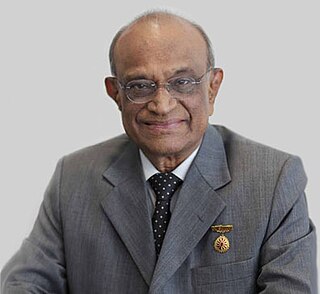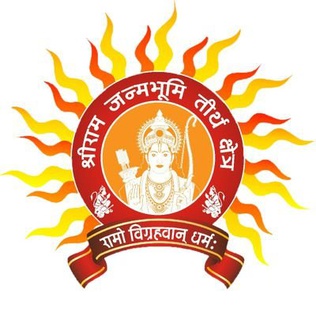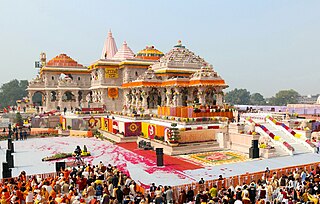Related Research Articles

Lal Krishna Advani is an Indian politician who served as the 7th Deputy Prime Minister of India from 2002 to 2004. He is one of the co-founders of Bharatiya Janata Party (BJP) and a member of the Rashtriya Swayamsevak Sangh (RSS), a right-wing Hindu nationalist volunteer organization. He is the longest serving Minister of Home Affairs serving from 1998 to 2004. He is also the longest serving Leader of the Opposition in the Lok Sabha. He was the prime ministerial candidate of the BJP during the 2009 general election.
Ram Janmabhoomi is the site that, according to Hindu religious beliefs, is the birthplace of Rama, the seventh avatar of the Hindu deity Vishnu. The Ramayana states that the location of Rama's birthplace is on the banks of the Sarayu river in a city called "Ayodhya". Modern-day Ayodhya is in the north Indian state of Uttar Pradesh. It is contested whether the Ayodhya mentioned in the Ramayana is the same as the modern city.

Kapila Vatsyayan was a leading scholar of Indian classical dance, art, architecture, and art history. She served as a member of parliament and bureaucrat in India, and also served as the founding director of the Indira Gandhi National Centre for the Arts.

Dharmasthala Veerendra Heggade is an Indian philanthropist and the hereditary administrator of the Dharmasthala Temple. He succeeded to the post at the age of 19, on October 24, 1968, the 21st in his line. He administers the temple and its properties, which are held in trust for the benefit of devotees and of Dharma. He is a nominated Member of Parliament in the Rajya Sabha since July 2022.

Jagmohan Malhotra, known by the mononym Jagmohan, was an Indian civil servant and politician. After working with the Indian National Congress, he joined the Bharatiya Janata Party in 1995. He served as Lieutenant Governor of Delhi and Goa, as the 5th Governor of Jammu and Kashmir, and for three terms as Member of Parliament for New Delhi. In the cabinet, he served as Union Minister for Urban Development and Tourism.

In Hinduism, the yatra (pilgrimage) to the tirthas has special significance for earning the punya needed to attain the moksha (salvation) by performing the darśana, the parikrama (circumambulation), the yajna, the Dhyana, the puja (worship), the prarthana, the dakshina, the seva, the bhandara, etc. These sacred places are usually located on the banks of sacred waters, such as sacred rivers or their tributaries, the kundas, the ghats, or the stepwells, or the temple tanks.

Umayalpuram Kasiviswanatha Sivaraman is an Indian musician and exponent of the Carnatic percussion instrument, the mridangam. He is a recipient of the Padma Vibhushan as well as the Sangeet Natak Akademi Award.

Fali Sam Nariman was an Indian jurist. He was a senior advocate to the Supreme Court of India from 1971 and was the President of the Bar Association of India from 1991 to 2010. Nariman was an internationally recognised jurist on international arbitration. He was honoured with the 19th Lal Bahadur Shastri National Award for Excellence in Public Administration 2018. He was one of India's most distinguished constitutional lawyers and argued several leading cases. He was the Additional Solicitor General of India from May 1972 to June 1975.

Mohan Dharia was a Union minister, a lawyer and social worker. During his last days he stayed in Pune. Dharia was an environmentalist and ran a non-government organisation Vanarai. He was elected to the Lok Sabha twice from Pune Lok Sabha constituency, first in 1971 as an Indian National Congress (INC) member and became a Minister of State, and later in 1977 as a Bharatiya Lok Dal member, and joined the Morarji Desai Ministry as Union Minister of Commerce. Prior to it, he remained member of the Rajya Sabha twice from INC, first 1964-1970 and then 1970- 1971
Ram Janmabhoomi Nyas is an organisation which was formed as a trust to promote and oversee the construction of a temple in Ayodhya, India at the Ram Janmabhoomi, the reputed site of the birth of the Hindu deity Rama. The Nyas was formed by members of the Vishva Hindu Parishad.

Raghunath Mohapatra was an Indian architect, sculptor, and a Nominated Member of Rajya Sabha. He was awarded Padma Shri in 1975 and Padma Bhushan in 2001. He was awarded Padma Vibhushan in 2013 on occasion of 64th Republic Day of India.

G. Bakthavathsalam is an Indian surgeon who is the chairman and managing trustee of Dharmaveera K Govindaswamy Naidu Medical Trust, which runs the K.G. Hospital in Coimbatore, India. He was awarded a Padma Shri in 2005. Dr GB, as he is known, was born on 5 April 1942 at Annur village of Coimbatore district and graduated with a Masters of Science from Madras Medical College. He then received his post graduate training in surgery at the Mount Sinai Hospital in Chicago (USA).

Shri Ram Janmabhoomi Teerth Kshetra is a trust set up for the construction and management of Ram Mandir in Ayodhya by the Government of India in February 2020. The trust is composed of 15 trustees.

The Ram Mandir is a partially constructed Hindu temple complex in Ayodhya, Uttar Pradesh, India. Many Hindus believe that it is located at the site of Ram Janmabhoomi, the mythical birthplace of Rama, a principal deity of Hinduism. The temple was inaugurated on 22 January 2024 after a prana pratishtha (consecration) ceremony. On the first day of its opening, following the consecration, the temple received a rush of over half a million visitors, and after a month, the number of daily visitors was reported to be between 100,000 and 150,000.

Mahant Nritya Gopal Das is the head of Ayodhya's largest temple, the Mani Ram Das Ki Chavani, and the chief of the Ram Janmabhoomi Nyas and Shri Ram Janmabhoomi Teerth Kshetra, bodies formed to undertake the construction of the Ram Mandir in Ayodhya. He is also the head of the Shri Krishna Janmasthan Seva Sansthan.

The Prana pratishtha (consecration) ceremony of the Ram Mandir was held on 22 January 2024, in a traditional sacred ceremony, wherein priests recited mantras invoking the God Rama. The Prana Pratishtha ceremony, that is considered to bring a presence of divinity, is an essential ritual before the inauguration of a Hindu temple. The ceremony involved the pran pratishtha of the primary temple deity, Ram Lalla, also known as Balak Ram, and subsequent opening of the temple for visitors.
References
- 1 2 3 Roy, Debayan (18 October 2019). "Parasaran, the 'pitamah' of Indian lawyers got his wish when Ayodhya hearings ended". ThePrint. Retrieved 9 November 2019.
- ↑ "Meet K Parasaran, the 93-year-old Advocate For Hindus Whose Spiritual Connect With Ram Kept Him Going". News18. Retrieved 9 November 2019.
- ↑ "Ministry of Home Affairs notifies temple trust; RSS, VHP members kept out". The Hindu. 5 February 2020. ISSN 0971-751X . Retrieved 6 February 2020.
- 1 2 "At 92, key face in Ayodhya case K Parasaran is a trusted voice of many governments". The Indian Express. 12 August 2019. Retrieved 9 November 2019.
- 1 2 Express Web Desk (6 February 2020). "Who is K Parasaran?". The Indian Express.
- 1 2 Roy, Debayan (18 October 2019). "Parasaran, the 'pitamah' of Indian lawyers got his wish when Ayodhya hearings ended". The Print.
- ↑ "K Parasaran, 'Pitamaha' of India Bar, emerges hero in Ayodhya land dispute case". www.businesstoday.in. Retrieved 24 November 2019.
- ↑ "Parasaran, Vittal, Natarajan among Padma awardees". The Hindu. 26 January 2011. ISSN 0971-751X . Retrieved 24 November 2019.
- ↑ "M Venkaiah Naidu presents Most Eminent Senior Citizen Award to K Parasaran | DD News". ddnews.gov.in. Retrieved 24 November 2019.